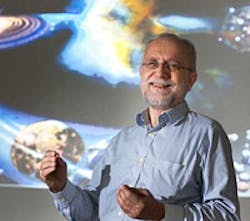Leiden, Netherlands -- Leiden astronomer Xander Tielens has been awarded a Spinoza prize, the highest scientific prize in the Netherlands. Tielens is Professor in the Physics and Chemistry of Interstellar Space. He studies large and complex, often organic, molecules found in interstellar space. The Spinoza prize carries a cash award of 2.5 million euro.
Tielens is well known for his pioneering research into polycyclic aromatic hydrocarbons (PAHs) in space. PAHs constitute a group of hundreds of large organic molecules. On earth they have a bad name as carcinogenic by-products of fried meat or fossil fuels. But PAHs are also found in many locations in the far and near universe and are a highly interesting phenomenon for researchers of planets, stars and galaxies.
Tielens was one of the first astronomers to understand the importance of such large molecules as PAHs and interstellar dust; he has authored a book on the subject. He is the most cited active astronomer in the Netherlands. In 2009 he won a major European subsidy to identify PAHs, trace their physical and chemical development and also to study their role in the formation of planets and stars or as the early precursors of life. His research is carried out both in the lab and in space.
In addition, Tielens has made significant contributions to research on interstellar dust and ice and on the effect of gas in so-called photodissociation regions. This is a process by which a molecule disintegrates when it absorbs a photon (light particle). This effect is due to radiation from nearby stars. Tielens discovered that a large proportion of the interstellar gas is found in those areas where molecules disiintegrate as a result of the effect of stellar radiation.
Tielens is closely involved in the development and use of large apparatus and satellites, including the SOFIA telescope for infrared astronomy and the European Herschel satellite which is used to study the formation of galaxies and stars. The HIFI instrument, built by the Dutch SRON, is on board the Herschel. The main task of this instrument is to trace water and other molecules in space. Tielens is project scientist of HIFI.
Tielens is Leiden University Professor of the Physics and Chemistry of Interstellar Space. He studied astronomy and obtained his PhD at Leiden University in 1982. He subsequently spent a number of years as US National Research Council Associate at the Ames Research Center at NASA. From 1985 he was researcher at the University of California in Berkeley. In 1989 he became senior researcher at the Ames Research Center. Eight years later he returned to the Netherlands as Professor of Astrophysics in Groningen and senior researcher at NWO’s SRON institute. In 2004 he was appointed full-time Professor at the University of Groningen. In 2005 Tielens again became senior researcher at Ames. He retained his appointment in Groningen as Professor by Special Appointment. Xander Tielens came to Leiden University in 2009. In the same year he received the prestigious Advanced Grant of the European Research Council (ERC).
-----
Follow us on Twitter and 'like' us on Facebook
Follow OptoIQ on your iPhone; download the free app here.
